
The Levity Effect
Why it Pays to Lighten Up
By Adrian Gostick,
Published 04/2008
About the Author
Adrian Gostick and Scott Christopher, the dynamic duo behind The Levity Effect, have created a profound impact in the world of business literature. Adrian Gostick is the author of several New York Times bestsellers including The Invisible Employee and The Carrot Principle. His expertise spans over employee engagement and workplace culture. Scott Christopher, on the other hand, is not only an accomplished author but also a sought-after speaker and a regular columnist for Workplace HR magazine. His work in humor and its application in the workplace is widely recognized, making him an authority on the subject.
Gostick and Christopher bring a unique blend of rigorous research and engaging storytelling to their work. Their extensive background in business consulting and human resources provides them with firsthand insights into the corporate world's challenges and opportunities. Their collaborative writing style combines Gostick's analytical approach with Christopher's humorous and relatable anecdotes, creating a compelling narrative that resonates with readers.
Main Idea
The core idea of The Levity Effect revolves around the transformative power of fun and humor in the workplace. The authors argue that integrating levity into professional environments leads to increased productivity, employee engagement, and overall job satisfaction. By presenting extensive research and case studies, they illustrate how lighthearted leadership and a fun work culture can significantly enhance business outcomes. The book challenges the traditional notion that work must be serious and devoid of joy, proposing instead that a balance of levity and professionalism can lead to remarkable results.
Gostick and Christopher assert that levity is not about frivolity or distraction but about creating a positive, energetic atmosphere that fosters creativity, collaboration, and resilience. They provide compelling evidence that leaders who embrace humor are more effective communicators, build stronger teams, and achieve higher levels of success. The book underscores the idea that humor can be a powerful tool for navigating challenges, reducing stress, and building a cohesive and motivated workforce.
Table of Contents
- The Case for Levity
- Leading with Levity
- Communication: If They're Laughing, They're Listening
- A Happy and Healthy Work Environment
- Innovation: With Comedy, There's Creativity
- Respect: In You They Trust
- Health: Good for What Ails You
- Wealth: Laughing All the Way to the Bank
- Getting Lighter
- 12 Ways to Have Fun at Work
- Overcoming Objections to Levity
- Levity for Life: Bringing Home the Fun
The Case for Levity
Levity in the workplace means being light, buoyant even, which can dramatically improve a work environment. The word "levity" is derived from the Latin word "levitas," meaning to lighten or raise. This notion of lifting spirits through humor and fun is central to the book's thesis. Research shows that leaders who embrace levity are able to create more trusting, creative, and communicative teams, leading to lower turnover and higher morale. For instance, humor has been proven to enhance negotiation skills, build rapport between leaders and employees, and make information more memorable.
Levity is about finding joy in everyday experiences and fostering an environment where humor can naturally thrive. The authors emphasize that levity is not about forcing comedy but about cultivating a culture where employees feel comfortable expressing their humor. This approach leads to a more engaged and motivated workforce.
The book presents numerous case studies from companies like Virgin, Boeing, Marriott, Nike, KPMG, and Zappos, all of which have successfully integrated humor into their workplace cultures. These examples demonstrate that a lighthearted approach can lead to tangible business results, including higher productivity, increased employee loyalty, and better customer satisfaction.
Fun Not Funny
Researchers Lawrence J. Peter and Bill Dana emphasize that a sense of humor is deeper than laughter. It is about finding joy in everyday experiences rather than just being entertaining. Leaders who understand this difference are more successful in fostering a positive work culture. They do not force comedy but instead cultivate an environment where humor can naturally thrive.
Sign up for FREE and get access to 1,400+ books summaries.
You May Also Like
The Subtle Art of Not Giving a F*ck
A Counterintuitive Approach to Living a Good Life
By Mark MansonRich Dad Poor Dad
What the Rich Teach Their Kids About Money - That the Poor and Middle Class Do Not!
By Robert T. KiyosakiHow To Win Friends and Influence People
The All-Time Classic Manual Of People Skills
By Dale CarnegieQuiet: The Power of Introverts
The Power of Introverts in a World That Can't Stop Talking
By Susan Cain



















